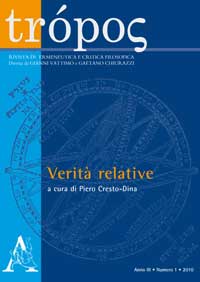Relativism and the Norm of Truth
DOI:
https://doi.org/10.13135/2036-542X/7634Parole chiave:
relativismo, verità, John MacFarlane, Gareth Evans, norme, asserzioniAbstract
In diversi contributi John MacFarlane ha sostenuto che certe classi di asserzioni devono essere considerate vere relativamente a un contesto di valutazione (context of assessment) e false relativamente a un altro contesto di valutazione. Secondo Gareth Evans, tuttavia, si può affermare che se la verità di una proposizione diviene relativa, allora cessa di funzionare come norma dell’asserzione, in quanto non fornisce più una meta o un’intenzione stabile per le asserzioni. La risposta di MacFarlane consiste nel negare che l’orientamento alla verità sia una caratteristica necessaria per tutte le asserzioni. Questo saggio argomenta che MacFarlane non raccoglie la sfida correttamente lanciata da Evans, e ciò per due motivi: 1) non riesce a rendere conto delle norme di un’asserzione che non presupponga la norma della verità; 2) la sua spiegazione delle norme dell’asserzione rimane esposta a obiezioni del genere di quelle di Evans.


